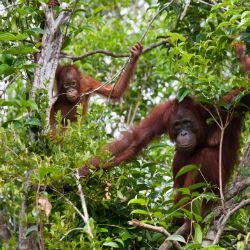Smoke Inhalation A Real Threat To The Survival Of The Orangutan

Large scale farming, human encroachment and logging have resulted in habitat loss for orangutans which are now critically endangered. If that threat was not enough, they face another threat in the form of smoke that results from both natural and man-made fire according to the results of a new study. Researchers studying orangutans in the forests of Indonesian Borneo found that their work had to be halted as a result of fires which they helped fight. These fires usually occur every year when small farms and plantations clear the forest to plant crops.
Orangutan behaviour was different
The researchers said they were just a few weeks into the annual fire season when they noticed a different the “long call” made by male orangutans which scientists think is used to attract females as well as warn other males. The researchers say they thought the sound was a little raggedy, very similar to the sound humans make when they smoke a lot. As a result, the researchers decided to investigate whether orangutans who inhaled smoke during fire season suffered from the same kind if ill effects humans who inhale smoke do.
Orangutans bodies respond to smoke inhalation
The researches observed four males who weigh about 200 pounds each, collecting their urine on a daily basis. After analysing both urine and behaviour the researchers found that adult males travelled less frequently, engaged in more rest and consumed more calories. The orangutans also produced more ketone bodies which are molecules produced by the liver from fatty acids during periods of low calorific intake. This finding was paradoxical given the fact that orangutans were eating more, so it begs the question, why are the orangutans burning fat?
Fire frequency and intensity has grown recently
The only thing that had changed was the presence of smoke and fire during the three-month period. The forest floor is made up of peat which is highly flammable and as a result fires tend to rage underground for weeks at a time. During 2015 the fires were especially intense as a result of a strong El Niño effect which also resulted in drought. According to analysis of the soil, wildfires have been taking place in Borneo for thousands of years but have grown in intensity and frequency over the last few decades due to deforestation and the draining of peatlands.
Fires caused premature human deaths
In 2015 Indonesia experience the most intense fire and smoke pollution ever recorded, burning almost 24,000 square kilometres of peatlands, or nearly 12 per cent of total peat area. Peatland fires not only destroy forests but the also release greenhouse gasses and generate hazardous particles which float in the air which are the leading causes globally of pollution related deaths. Studies suggests that the fires resulted in the premature deaths of between 12,000 to 100,000 humans, but almost no research has been conducted on the effects on wildlife.
Fires also have devastating effects on wildlife
Between 1999 and 2015 nearly 100,000 Bornean orangutans unexpectedly died in untouched forests in Kalimantan suggesting that habitat loss could not be the sole reason behind a declining population of the endangered species. Frequent exposure to toxic smoke is likely to have had severe consequences for orangutans as well as other species and humans. The research indicates that we need to understand the long term and indirect impact of these peatland fires in Indonesia and not limit our conclusions to simply habitat loss.



